
This post may contain affiliate links. Click here to find out more about this.
Table of Contents
Many experts tell you that if you want to get on page one of Google, you need to write 2300-word articles when you first start out in marketing.
They didn’t have to be exactly 2300 words, but anything in that range was acceptable.
Let’s be honest. I don’t think people want to read so many words about particular sectors or topics. Consider someone looking up “how to tie a tie” on Google. Would you be interested in reading 2000 words? Or even a thousand?
Most likely not. You’d rather just look at a few pictures or watch a video that shows you how to knot a tie.
Google now looks at whether someone clicks on a search result and then immediately exits.
When a lot of people leave an article, Google knows it’s probably not that good and shouldn’t be rated as high as it is.
However, does word count have an impact on your results or overall traffic, and how does it vary by industry?
I didn’t want to rely on my gut to answer this question, so my team gathered data from BuzzSumo, Ubersuggest, and Ahrefs.
We looked at over 10,000 articles that were popular in the industries below based on social traffic, backlinks, and SEO traffic:
- Education
- Investment
- Entertainment
- Travel
- Sports
- E-Commerce
- Retail
- Insurance
- Economics
- Technology
- Construction
- Automotive
- Real Estate
- Engineering
- Energy
Here’s what we learned:

See How My Agency Can Drive Massive Amounts of Traffic to Your Website
SEO – unlock massive amounts of SEO traffic. See real results.
Content Marketing – our team creates epic content that will get shared, get links, and attract traffic.
Paid Media – effective paid strategies with clear ROI.
What is the average word count of content types related to each industry?
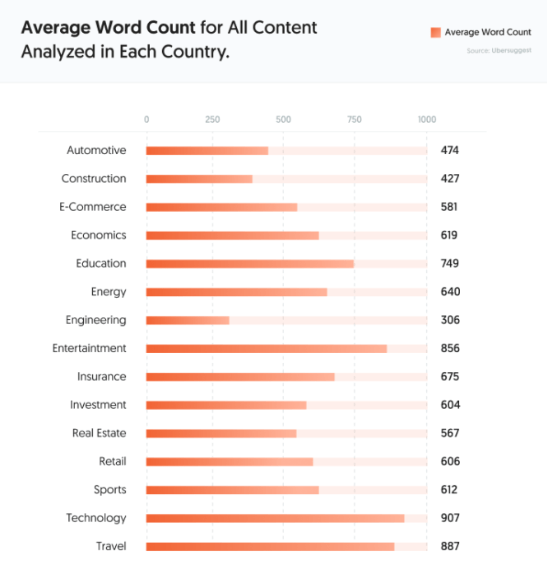
Most people don’t write 2300-word blog pieces, as you can see. In most sectors, it isn’t practical to have all content be extremely detailed.
For each industry we looked at, the average word count was roughly 900 words or less.
Let’s have a look at the many types of material that were created for each business.
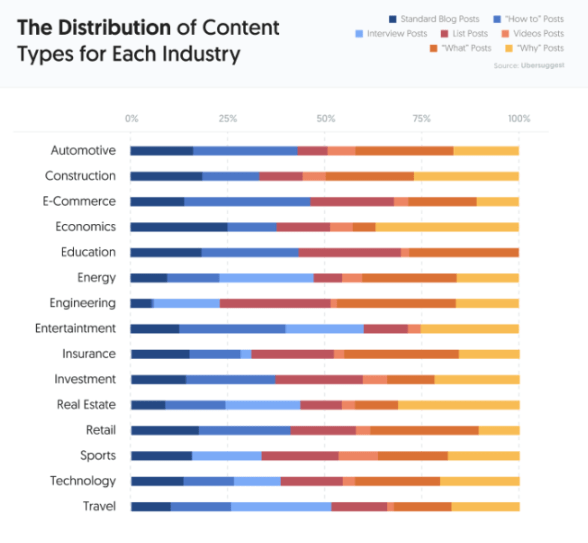
It varied per industry but “How To”, “What” posts, and “Why” posts were popular for most industries.
Now let’s look at the word count per industry for each content type.
What is the average word count per industry for specific content types?
With this analysis we looked at the 4 most common types of posts:
- “How to” posts
- List” posts
- “What” posts
- “Why” posts
Here is the average word count for each of them per industry.
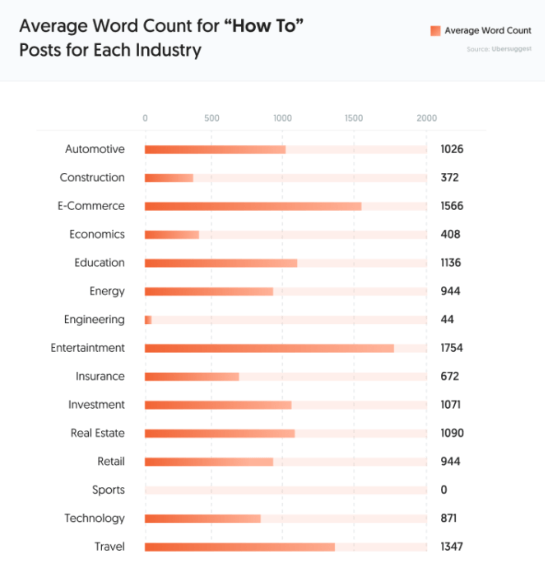
When compared to the average word count per sector graph displayed above, “How To” posts are much longer.
Engineering had a significantly smaller percentage, but when we looked into why we discovered that a lot of engineering content was biased toward videos. That makes sense when you realize how complex many engineering-related topics can be.
In addition, we looked at over 10,000 popular stories from around the web. As a result, not every industry had the largest sample size.

The average word count for “List-Based” posts for most industries was similar in length to “How To” posts.
Although, that wasn’t the case for “What” based posts.

On average “What” based posts were longer than “How To” and “List-Based” posts.

Finally, the graph above depicts the length of posts based on “Why” by industry.
Let’s have a look at backlinks now.
At each word count barrier, what is the average number of backlinks for posts?
Based on the length of the content, this is the backlink count.
Keep in mind that we’re looking at the most popular articles in each industry. This number of backlinks does not apply to all articles.
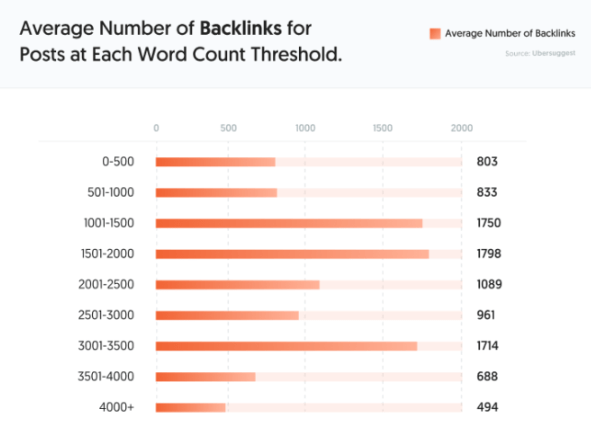
As shown in the graph above, posts with word lengths of 1001-1500 or 1501-2000 receive over 1700 backlinks. The same goes for word counts of 3001-3500 words.
According to this graph, striving for a content length within these 3-word count ranges will result in the most backlinks providing your content is of excellent quality.
What is the average traffic received for posts at each word count threshold?
Backlinks aren’t everything.
Even if you have a ton of backlinks, it doesn’t mean you are guaranteed traffic. Here is the average traffic for posts based on word count.

The most traffic was created by posts with a word count of 250-3000 words. It was followed by posts ranging from 300 to 350 words, and then 350 to 4000 words.
If you’re optimizing for traffic, sticking to a word count of 2501 to 4000 words is the way to go, but that may not be the case in every business. So let’s delve a little deeper into the facts.
For each industry, the traffic distribution by word count threshold looks like this.
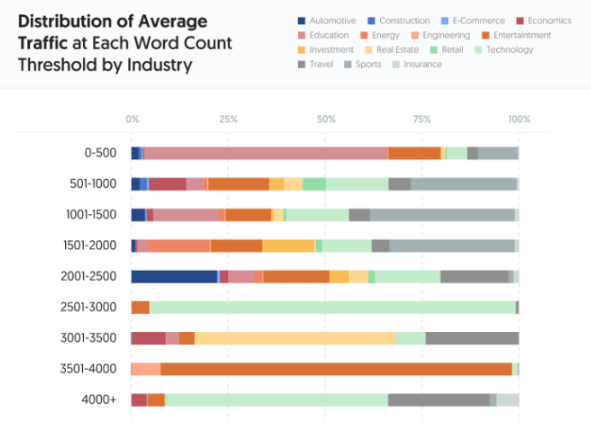
Every industry is different as you can see above.
In the Education space, it’s clear that people prefer shorter content that is under 500 words. At the same time, posts that are 3501-4000 words do well in the entertainment industry, and 4,000+ words posts do well for Technology or Travel.
What is the average number of social media shares for word counts in each industry?
Let’s see what social media users liked.
We focused on Facebook, Twitter, and Pinterest for the graph below because not all social networks would give us sharing data.
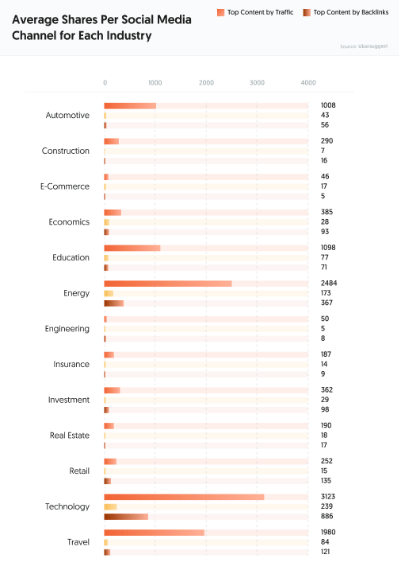
As you can see, some industries just aren’t as sharable as others. For example, I don’t think most people care to share articles on Engineering or E-Commerce, or Insurance.
Travel and Technology, on the other hand, did exceptionally well.
To get even more granular here is the data broken down by industry on Facebook.
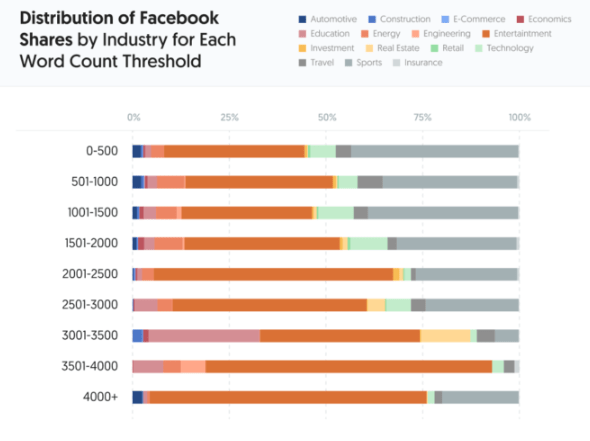
Here is the data for Twitter broken down by industry.
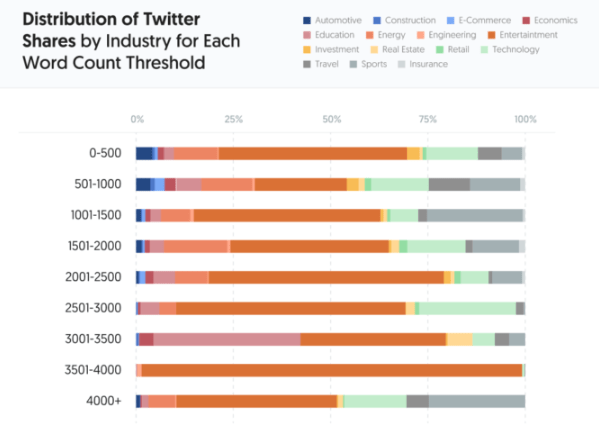
Lastly, here is the Pinterest data.
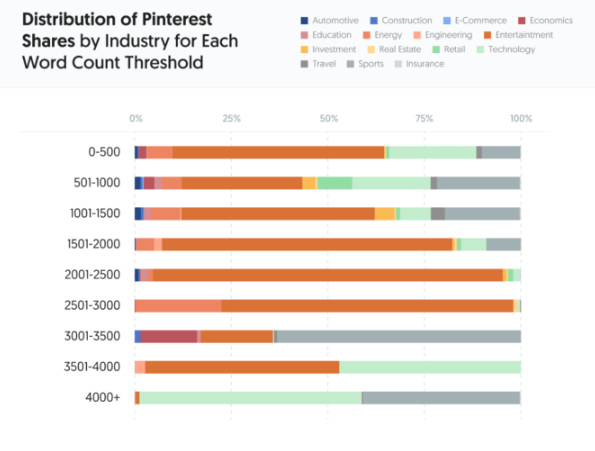
Based on your industry, and the word count you’re targeting for your article, the 3 charts above will give you guidance on which social media channels you should focus on to get more shares.
How many keywords are ranking on the 1st page of Google for content with different word counts?
For this analysis, we shortlisted between 80-100 URLs at each word count threshold that was looked at manually to identify the number of keywords in positions 1-10.
Approximately 8.5% of all URLs from the total analysis were used to answer this question.
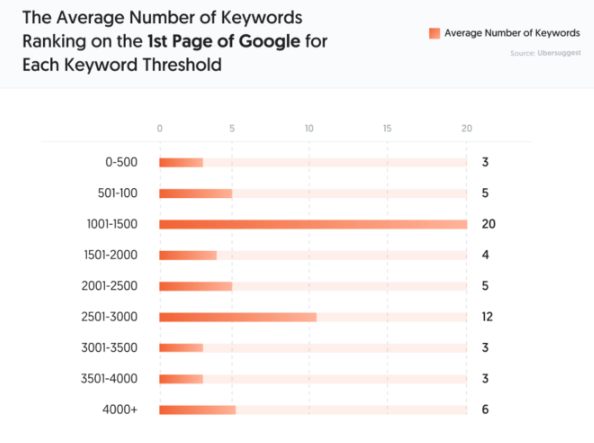
Articles with 1001-1500 words tended to have a lot more page 1 rankings than shorter articles. Articles within the 2501-3000 word range also did well.
This isn’t to say that if you want to rank higher on page one, your content should be inside these word count limits. Whatever word count range you wind yourself in, you should always focus on delivering quality.
The fewer words and valuable substance you can put in a shorter piece, the better. In principle, this would result in fewer Google page 1 ranking.
However, Google has seen enough “words” to determine what your article should rank for after a certain point, such as with 1000-1500 word postings.

See How My Agency Can Drive Massive Amounts of Traffic to Your Website
SEO – unlock massive amounts of SEO traffic. See real results.
Content Marketing – our team creates epic content that will get shared, get links, and attract traffic.
Paid Media – effective paid strategies with clear ROI.
What is the average word count of top-performing content for each industry?
For this section, we selected the posts from each industry that received:
- the top 10% of traffic
- the top 10% of total social media shares (Facebook, Twitter, and Pinterest combined)
- the top 10% of backlinks
That way, you could clearly see the average word count for the best performers.
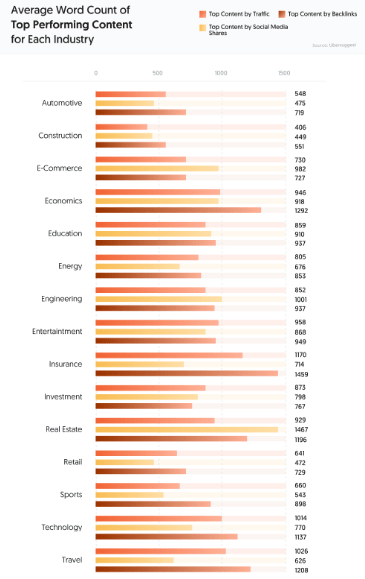
It’s clear that if you want to be in the top 10% in your industry, your article will be at least 500 words and probably under 1500.
Conclusion: Does Word Count Impact Performance?
From the standpoint of social shares, backlinks, ranking, or traffic, a high word count isn’t a guarantee of success.
The information above, on the other hand, can assist you to figure out roughly where you should aim your article for your industry.
You can succeed greatly if you combine it with your SEO and paid advertising efforts.
In general, you don’t want “fluff” in your material, and you should keep it short and to the point. At the same time, you want your essay to be deep and comprehensive enough for people to understand all of the points you’re trying to make.
You should also utilize subheadings, as I did in this article, to make it easier to skim your information, which is particularly important if it is long. Examining your sources to see how you can extract better data from your content to draw better conclusions can also be beneficial.
What word lengths do you generally target and how long is your content?

